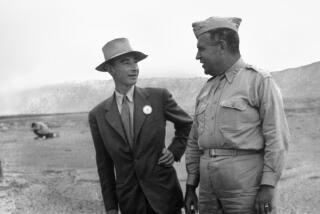Einstein in America : THE SCIENTIST’S CONSCIENCE IN THE AGE OF HITLER AND HIROSHIMA by Jamie Sayen (Crown: $17.95; 340 pp., illustrated)
- Share via
Albert Einstein regards us today from familiar posters, wobbling along on his bicycle or sticking out his tongue. The old man with the floating white hair, prophet’s eyes and drooping mustache showed us that energy and matter are equivalent, that space curves and that nothing can go faster than the speed of light. His relativity theory has replaced Newton’s law of gravity. Yet, this same man, as a popular greeting card reminds us, once wrote to a friend, “I shall not become a Ph.D. The whole comedy has become a bore to me.”
The most widely recognized modern scientist, and arguably the greatest scientist of all time, Einstein the man has remained an enigma. Few facts about his life outside science have filtered down from the Olympian heights that he occupied in Princeton, N. J., from 1933 until his death in 1955.
His life in science has been chronicled fully, most recently and best by physicist Abraham Pais (“Subtle Is the Lord”), who was for years Einstein’s close colleague and friend. Einstein’s private life, however, and his influential public life as a commentator on the politics and social developments of his time have not until now received the attention they deserve.
Historian Jamie Sayen’s thoroughly researched and elegantly written “Einstein in America” sheds new and salutary light on Einstein the private and public citizen. Sayen focuses his book on Einstein’s response to the rise of Nazism, the destruction of European Jewry, the Second World War, the development and use of atomic weapons, the Cold War, and McCarthyism. Sayen demonstrates that Einstein in his Princeton years was “a preeminent moral figure of the Western world,” and directs his study behind the Einstein myth to discover its basis, and to ask when it is valid and when it is invalid, misleading or outright false.
As Sayen shows, Einstein was a pacifist and an internationalist in a time when such views were considered hopelessly naive. The author purposes to “clear away the lazy prejudices and misperceptions of those who seek to dismiss Einstein’s political activity out of hand.” He shows Einstein to be “a man without personal ambition whose political ideas represent a lifelong effort to discover ways to advance justice and decency in a world that has been brought to the edge of extinction by technological progress unaccompanied by progress in the realm of human affairs.”
The book’s power derives less from its exposition of Einstein’s grand social and political ideas than from the rich trove of anecdotal detail the author has assembled to support them. Einstein’s range of intellectual and artistic interests, for example, was enormous. “Dostoevsky gives me more than any scientist,” he told his first biographer, Alexander Moszkoski, in 1920. And to Belgium’s Queen Mother he wrote, in 1936, “Mozart remains as beautiful and tender as he always was and always will be. There is, after all, something eternal that lies beyond reach of the hand of fate and of all human delusions.”
Not surprisingly, the prototypical genius Einstein was also a caricature of the absent-minded professor. One of many anecdotes that Sayen authenticated had Einstein walking with his wife to a dinner given by a Princeton University professor. When they reached the professor’s neighborhood, Einstein realized that he had forgotten the man’s address. He knocked on the front door of a house to ask directions, and when the occupant answered the door, Einstein couldn’t remember the name of his dinner host.
Author Sayen is as meticulous with the details of Einstein’s daily life as the great scientist was careless. But this highly promising first book, fine as it is, does not entirely avoid the danger facing the biographer of a great and good man, namely, that of canonizing his subject, a charge against which the author defends himself with only partial success. Nonetheless, we forgive Sayen his worshipfulness, and find ourselves at the end of his book quite in sympathy, not only with the author, but also with the little girl who saw Einstein wandering alone on a footpath in Princeton and asked her mother, “Is that the Lord?”
More to Read
Sign up for Essential California
The most important California stories and recommendations in your inbox every morning.
You may occasionally receive promotional content from the Los Angeles Times.












